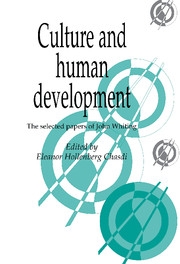Book contents
- Frontmatter
- Contents
- List of figures
- Preface
- Acknowledgments
- Introduction: John Whiting and anthropology
- Fifty years as a behavioral scientist: autobiographical notes
- Part I Theory and methods
- Part II Environment and history
- Part III Moral development
- Part IV Gender development
- Introduction
- 8 The absent father and cross-sex identity
- 9 Effects of climate on certain cultural practices
- 10 Male sex-role resolutions
- Part V Development of social behavior
- Bibliography
- Complete bibliography of John W. M. Whiting's work
- Index
8 - The absent father and cross-sex identity
Published online by Cambridge University Press: 23 December 2009
- Frontmatter
- Contents
- List of figures
- Preface
- Acknowledgments
- Introduction: John Whiting and anthropology
- Fifty years as a behavioral scientist: autobiographical notes
- Part I Theory and methods
- Part II Environment and history
- Part III Moral development
- Part IV Gender development
- Introduction
- 8 The absent father and cross-sex identity
- 9 Effects of climate on certain cultural practices
- 10 Male sex-role resolutions
- Part V Development of social behavior
- Bibliography
- Complete bibliography of John W. M. Whiting's work
- Index
Summary
In this paper, we shall present evidence on the effect of the father's position in the family as it relates to the growing child's learning by identification and to the development of his sex identity. This evidence consists first of a cross-cultural study done at the Laboratory of Human Development, Harvard University, and second, a review of recent research in the United States and Europe, relevant to our theory of identification, on the effect of father absence in the household.
The status-envy hypothesis
Before presenting this evidence, however, we would like to state our view on the process of identification and the development of identity. This view we would like to call the status-envy hypothesis. This hypothesis may be summarily stated as follows: The process of identification consists of the covert practice of the role of an envied status. Identification consists of learning a role by rehearsal in fantasy or in play rather than by actual performance, and this rehearsal is motivated by envy of the incumbent of a privileged status.
Let us consider the mother–infant relationship in which the mother attempts to satisfy all of the infant's needs. According to our theory, if it were possible for the mother to supply everything the infant wanted, he would not identify with her as he already occupies the privileged status. Some learning does, of course, take place in such a complementary relationship. The child learns to give the proper signals when he wants something and to accept and consume it when it is offered. Furthermore, he learns to predict certain sequences of events determined by his mother's behavior. In other words, he has cognizance of his mother's role.
- Type
- Chapter
- Information
- Culture and Human DevelopmentThe Selected Papers of John Whiting, pp. 210 - 220Publisher: Cambridge University PressPrint publication year: 1993



